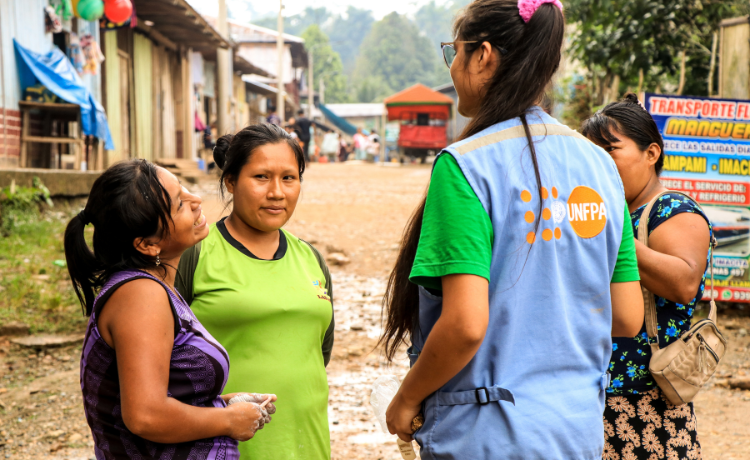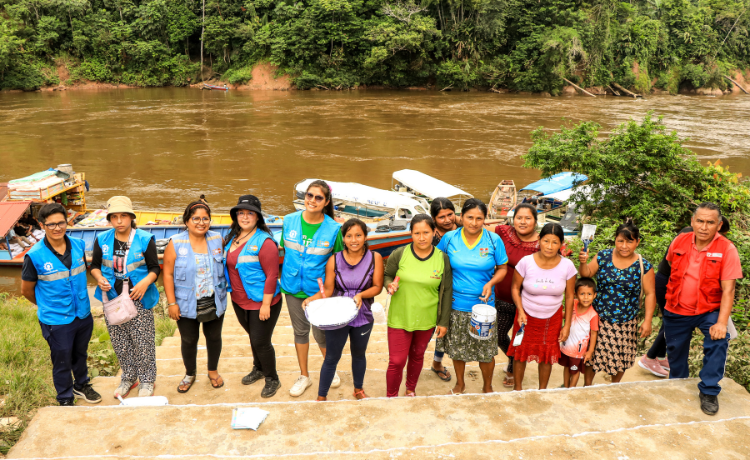News
“We say: Yes, you can”: Facing adversity and protecting women in the Peruvian jungle
- 13 September 2024
News
CONDORCANQUI PROVINCE, Peru – “We face torrential rains, relentless sun and long journeys from community to community,” said Dafne Aquino, 25, a psychologist dedicated to bringing hope, information and essential health services to indigenous women in the Peruvian Amazon.
“Sometimes we spend up to three hours on the river, with the constant risk of capsizing.” Ms. Aquino works with a team of nine all-female psychologists, one lawyer and two local interpreters in a mobile health unit supported by UNFPA, the United Nations sexual and reproductive health agency.
For the past three years, the team has been ensuring access to essential services and protection against gender-based violence for women and girls in even the most remote areas.
Ms. Aquino’s unit is part of the Nuwa Senchi project – which means ‘strong woman’ in the local Awajún language – an initiative funded by the USA to support indigenous women in El Cenepa, close to the border with Ecuador. A jungle area with dense vegetation and powerful rivers, it’s a place where communities are scattered, often only reachable after hours of travel in small boats navigating the surrounding waterways.
Yet these are not the only difficulties Ms. Aquino's team must face: They also work on changing ingrained, damaging mindsets and social norms. “The men used to say, ‘Before teaching them about women's rights, you first have to train them on their household duties,’” she told UNFPA.
Changing minds, empowering women
Across Peru, more than a quarter of women report having been subjected to physical violence by their partner or husband at some point in their life. In the Amazonas region, this rises to just over half.
“Gender-based violence is not just discrimination – it also means rape, murder, beatings and humiliation,” explained Ms. Aquino.
For her, each day is an opportunity to make a difference in the lives of women, girls and adolescents, building a future free from violence. “We empower them, we give them courage. We say, ‘yes, you can’.”

Since September 2023 the mobile health unit has reached over 13,000 people with life-saving information and support, and distributed hundreds of dignity kits containing essential sanitary and menstrual hygiene items. Three awareness-raising campaigns have also been implemented to shift damaging social norms and tackle gender inequality in the region.
In the village of Huampami, women used to have scarce support and protection mechanisms against gender-based violence. But after attending the Nuwa Senchi workshops, many said they felt safer and more empowered. “We know our rights and are more willing to respond,” said Valeria.*
“Women now know they can talk to us,” added Ms. Aquino. The team also works with partners in health care, education, protection and justice to ensure a comprehensive response to gender-based violence in the region.

Climate crises heighten risks of violence
Regions like the Amazonas are also acutely exposed to the damaging effects of climate change, and climate disasters have been shown to lead to greater vulnerability to gender-based violence just as support structures can be harder to access or are no longer able to operate.
To help bridge this gap, in Santa María de Nieva, the capital of Condorcanqui province, UNFPA has installed a ‘Gesell chamber’, a structure designed to ensure prompt and appropriate handling of cases involving sexual, physical and psychological violence. In the chamber, survivors can record their testimony in one session with a trained psychologist while a judicial expert observes from a separate room.
UNFPA has already equipped four safe spaces in the province for recovery and protection from gender-based violence, which also promote bodily autonomy and solidarity among women through group workshops and psychological support sessions.
*Name changed for privacy and protection.